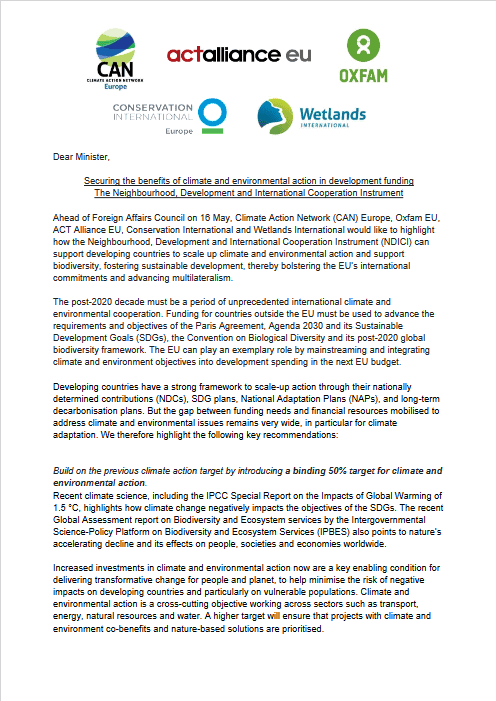Dear Minister,
Securing the benefits of climate and environmental action in development funding: The Neighbourhood, Development and International Cooperation Instrument
Ahead of the Foreign Affairs Council on 16 May, Climate Action Network (CAN) Europe, Oxfam EU, ACT Alliance EU, Conservation International and Wetlands International would like to highlight how the Neighbourhood, Development and International Cooperation Instrument (NDICI) can support developing countries to scale up climate and environmental action and support biodiversity, fostering sustainable development, thereby bolstering the EU’s international commitments and advancing multilateralism.
The post-2020 decade must be a period of unprecedented international climate and environmental cooperation. Funding for countries outside the EU must be used to advance the requirements and objectives of the Paris Agreement, Agenda 2030 and its Sustainable Development Goals (SDGs), the Convention on Biological Diversity and its post-2020 global biodiversity framework. The EU can play an exemplary role by mainstreaming and integrating climate and environmental objectives into development spending in the next EU budget.
Developing countries have a strong framework to scale up action through their nationally determined contributions (NDCs), SDG plans, National Adaptation Plans (NAPs), and long-term decarbonisation plans. But the gap between funding needs and financial resources mobilised to address climate and environmental issues remains very wide, in particular for climate adaptation.
We therefore highlight the following key recommendations:
Build on the previous climate action target by introducing a binding 50% target for climate and environmental action.
Recent climate science, including the IPCC Special Report on the Impacts of Global Warming of
1.5 °C, highlights how climate change negatively impacts the objectives of the SDGs. The recent Global Assessment Report on Biodiversity and Ecosystem Services by the Intergovernmental Science-Policy Platform on Biodiversity and Ecosystem Services (IPBES) also points to nature’s accelerating decline and its effects on people, societies and economies worldwide.
Increased investments in climate and environmental action now are a key enabling condition for delivering transformative change for people and the planet, to help minimise the risk of negative impacts on developing countries and particularly on vulnerable populations. Climate and environmental action is a cross-cutting objective working across sectors such as transport, energy, natural resources and water. A higher target will ensure that projects with climate and environment co-benefits and nature-based solutions are prioritised.
Actions and measures contributing to meeting the target should put special emphasis on support for adaptation to climate change in poor, highly vulnerable countries.
The positive trends in climate spending stimulated by the current MFF’s target demonstrate the feasibility of increasing ambition. There is also great scope to scale up spending on the environment and biodiversity. The European Parliament recognised this in its position on the NDICI, with a 45% climate and environment spending target. A higher target in these spending programmes will contribute their share to the EU budget’s overall climate target, which stands at 30% in the European Parliament’s position.
Ensure the remaining funds do not contribute negative impacts on people, the climate or the environment through improved screening and fossil fuel exclusion
Appropriate social, environmental and climate screenings and impact assessments should be fully applied to the entire NDICI including its financial instruments the European Fund for Sustainable Development + and the External Action Guarantee. The instrument should develop a comprehensive exclusion list to ensure compliance with strict environmental, social and governance principles in line with the EU’s international commitments (excluding fossil fuels or operations which have significant social or environmental external costs, such as those that involve the violation of the rights of people to land and their access to livelihoods, or degradation of protected areas, Critical Habitats and Heritage sites).
A strong commitment to Agenda 2030 and the Sustainable Development Goals (SDGs) The SDGs and climate and environmental action are fundamentally interlinked. They are also mutually reinforcing. Instilling Agenda 2030 into the objectives of the instrument, and ensuring funding is supportive of countries’ SDG plans will ensure EU budget funding is used more coherently with all sustainable development goals and will maximise its impact.
We hope that you can take these recommendations forward, to ensure that EU budget external action funding is better and aligns commitments to developing countries and climate and environmental action.
Yours sincerely,
Wendel Trio
Director, Climate Action Network (CAN) Europe
